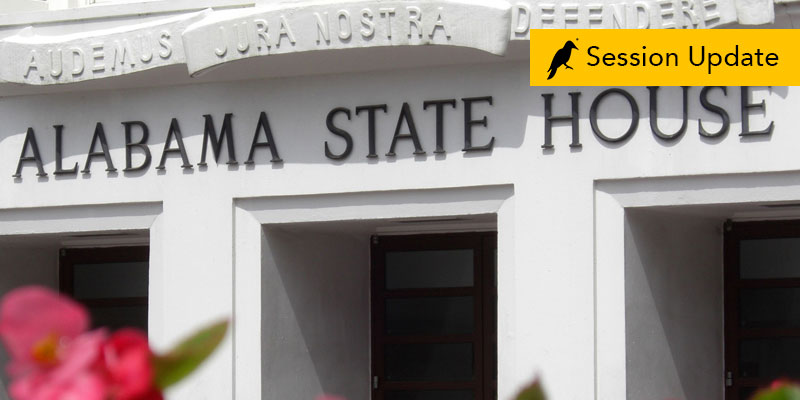The Alabama Legislature on Thursday completed a monumental day of legislating that including debates over the education budget, raising teacher pay, adding new protections for children at unlicensed day care centers and reforming juvenile justice.
As significant as those developments were, however, it is likely that the legislative action that will generate the most discussion at barstools and kitchen tables across the state was the Senate’s passage of a resolution urging Alabama to stay on daylight saving time year-round.
Here is a closer look at the day’s biggest action in Montgomery.
The big story: The state Senate gave final approval to a $6.6 billion education budget for the fiscal year that starts Oct. 1 and voted to boost salaries for teachers and support personnel by 2.5 percent.
The budget would spend the most money on education than 2008 when revenues peaked before the economic collapse that forced a decade-long nosedive in tax revenue.
“Nothing is more important than ensuring a quality education for every student in Alabama, and this education budget is a statement of strong support for our teachers and schools,” Finance and Taxation Education Committee Chairman Arthur Orr (R-Decatur) said in a statement. “This is also a sustainable budget that protects taxpayers”
Overly optimistic revenue forecasts caused painful midyear education budget buts six times in a span from 2001 to 2011. Orr noted that the state has not experienced proration since the Republican majority came to power in 2011.
Alabama’s nationally recognized pre-kindergarten program would get an $18.5 million boost over the current year. Orr pointed to a study by the University of Alabama at Birmingham indicating that students who participated in the pre-K program — known as First Class — outperformed other students on math and reading assessments.
The National Institute for Early Education Research has named the program the nation’s best for 11 consecutive years. But it currently is available in just 941 classrooms statewide. That would increase by 120 next year under the legislation.
“This fiscally responsible budget is another step in the right direction as we were able to include a pay raise for teachers, increased funds for school security, and additional money for
classroom supplies,” Senate Pro Tempore Del Marsh (R-Anniston) said in a statement.
The pay raise would cost $102 million. The budget also would fund a new robotics program for middle and high school students, offers $500,000 for mental health counselors and increases funding for textbooks by $11 million.
“This budget is an investment in the future of Alabama,” Senate Majority Leader Greg Reed (R-Jasper) said in a statement. “Conservatives in the legislature are strongly committed to fighting for Alabama’s students and teachers, and improving our schools to ensure that every student in every county in Alabama has access to a quality education,”
The House of Representatives now must pass the Senate’s budget or negotiate changes that would have to pass both chambers before heading to Gov. Kay Ivey for her signature.
Day care rules: In one of the most closely watched bills of the session, the Senate passed legislation on a 23-4 vote to impose new regulations on church-run day care centers.
The bill, the Child Care Safety Act, already has passed the House.
The bill would strengthen regulations for child care facilities that currently are exempt. It also requires health and fire inspections, requires insurance for faith-based programs and mandate criminal background checks for employees.
The bill’s House sponsor, Rep. Pebblin Warren (D-Tuskegee), told the Montgomery Advertiser that she was elated.
“I can’t even explain how I feel right now,” she told the paper. “I feel the blood running through my veins right now. I’m so happy. This is the day the Lord has made.”
VOICES for Alabama’s Children praised lawmakers for taking action but complained the bill did not go far enough.
“While the bill provides additional protections to some programs, we continue to reiterate our position — as we have clearly and repeatedly stated throughout this debate — that every child care facility should be licensed in the state of Alabama,” the group’s executive direction, Melanie Bridgeforth, said in a statement.
Bridgeforth added: “Collective efforts of advocates from around the state got us to this point and it will take those same voices and force to get us completely over the finish line with policy that requires all facilities to be licensed.”
More daylight at night? The Senate adopted a resolution urging President Donald Trump and the Department of Transportation to put Alabama on daylight saving time permanently.
Alabama also will send the resolution to other state legislatures asking them to join the effort.
Sen. Rusty Glover (R-Semmes) argued that making the switch would have clear benefits.
“This is something that Alabamians overwhelmingly want, and the research is clear: Daylight saving time is an unnecessary vestige of a bygone era that has become a burden on our citizens,” he said in a statement. “I want to thank my fellow legislators for joining me in this resolution, and I urge lawmakers around the country to do the same.”
Making the change would require congressional action, however, since a 1966 law prohibits states from saying on daylight saving time all year long.
It has its roots in an energy-conservation effort during World War I.
Armed teachers? The House Security Committee narrowly advanced a proposal to let teachers carry guns in school if they complete police-sponsored training.
To qualify, a teacher or school administrator would have complete a 40-hour training course that would comprise firearms safety, crisis management and active shooter training. Participants would have to complete a firearms test each year.
The school’s principal, superintendent and the local sheriff or police chief also would have to sign off.
“It’s also going to allow the superintendent, working with the principal as well as the local law enforcement agent, chief of police or the sheriff in that community, to actually decide who would carry,” the bill’s sponsor, Rep. Will Ainsworth (R-Guntersville) said, according to AL.com. “It’s still voluntary, strictly permissive.”
The 5-4 vote included dissents from three Democrats and Republican Harry Shiver, of Stockton.
Shiver, a former schoolteacher, said he opposed the bill because teachers with guns would be at risk of getting shot by police responding to a school shooting. He also said he worried because most teachers are women.
“I taught for 32 years and it’s mostly ladies that’s teaching, and they’ve got more things to worry about than carrying a gun,” he said.
Keeping youth out of prison: The Alabama House of Representatives voted 69-20 for legislation that would keep low-level juvenile offenders out of detention, according to the Associated Press.
Sponsored by Rep. Jim Hill (R-Moody), the bill would limit the offenses that could trigger detention. Other offenders would be directed to alternatives, like home detention.
According to the AP, two-thirds of children in detention in 2016 had not committed a felony. The bill would spend $35 million saved from detention costs to beef up community intervention programs.
“There is no doubt in my mind that placing children in out-of-home facilities should be your very last option,” said Hill, a former juvenile court judge. “The only way it can be the last option is if you locally have another one.”
Rep. Elaine Beech (D-Chatom), said the legislation is an “unfunded mandate” and would overburden juvenile probation officers in her rural district who are already stretched.
Tweet of the day:
We’d like to extend a tremendous thank you to all of the House members who supported Ala. counties and our youth today by voting YES on the county amendment to the juvenile justice reform bill, HB225. #OneVoice #alpolitics
— Alabama Counties (@AlabamaCounties) March 15, 2018
Brendan Kirby is senior political reporter at LifeZette.com and a Yellowhammer contributor. He also is the author of “Wicked Mobile.” Follow him on Twitter.













